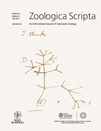
ZOOLOGICA SCRIPTA
Scope & Guideline
Elevating the discourse in animal science and systematics.
Introduction
Aims and Scopes
- Phylogenetics and Evolutionary Biology:
The journal emphasizes research that elucidates the evolutionary relationships among various animal taxa through molecular and morphological analyses. - Biodiversity and Taxonomy:
Zoologica Scripta publishes studies that contribute to the taxonomy of species, including the identification of cryptic species and the documentation of biodiversity across different ecosystems. - Biogeography and Conservation:
Research that explores the distribution of species and their evolutionary history is a key focus, particularly studies that have implications for conservation efforts. - Integrative Approaches in Systematics:
The journal encourages the use of integrative methods combining molecular, morphological, and ecological data to provide a comprehensive understanding of species and their relationships. - Ecological and Evolutionary Dynamics:
Articles often cover the ecological aspects of species interactions and evolutionary dynamics, shedding light on how these factors influence biodiversity.
Trending and Emerging
- Molecular Phylogenetics and Genomics:
There is a significant increase in studies utilizing genomic data to resolve phylogenetic relationships and clarify species boundaries, reflecting advancements in sequencing technology. - Integrative Taxonomy:
Research employing integrative approaches that combine molecular, morphological, and ecological data to define species and biodiversity is on the rise, showcasing a more holistic view of taxonomy. - Cryptic Diversity Studies:
The identification and documentation of cryptic species are increasingly highlighted, emphasizing the importance of thorough taxonomic revisions in understanding biodiversity. - Conservation Genetics:
Emerging themes include conservation genetics, focusing on genetic diversity and hybridization, which are crucial for species conservation strategies. - Phylogeography in Response to Climate Change:
Studies examining the effects of climate change on species distribution and genetic structuring are becoming more prevalent, indicating a growing concern for ecological and evolutionary consequences.
Declining or Waning
- Morphological-Based Taxonomy:
There is a noticeable decrease in studies relying solely on traditional morphological classifications, as molecular techniques dominate the field. - Generalized Ecological Studies:
Research that does not employ integrative or molecular approaches to ecology and biodiversity is becoming less prominent, as the journal shifts towards more detailed and rigorous methodologies. - Historical Biogeography without Genomic Data:
While historical biogeography remains relevant, studies that lack genomic insights or modern analytical techniques are less frequently published. - Non-Integrative Taxonomic Studies:
There is a decline in publications that do not adopt integrative taxonomy, as the field moves towards more comprehensive frameworks that combine various types of data. - Descriptive Studies Without Phylogenetic Context:
Research that focuses on mere species descriptions without placing findings in a broader phylogenetic context is losing traction.
Similar Journals
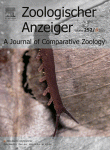
ZOOLOGISCHER ANZEIGER
Elevating Scholarly Discourse in ZoologyZoologischer Anzeiger is a prestigious peer-reviewed journal published by Elsevier GmbH in Germany, dedicated to advancing the fields of Animal Science and Zoology. With its consistent ranking in the Q1 category for both disciplines and a commendable Scopus rank of #165 out of 490, it stands out as a leading platform for innovative research and critical reviews in zoological sciences. The journal has been in continuous publication since 1961, navigating through different converged years, and remains a vital resource for researchers, professionals, and students aiming to deepen their knowledge and contribute to the dynamic field of zoology. Although it does not offer open access, the journal ensures that its content adheres to the highest standards of academic integrity and rigor, making it an essential read for anyone serious about animal biology and ecological studies. For research excellence and impactful scholarly discussions, Zoologischer Anzeiger is indispensable.
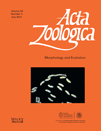
ACTA ZOOLOGICA
Contributing to the Future of Zoological ResearchACTA ZOOLOGICA, published by WILEY, is a distinguished journal that serves as an essential resource for researchers and professionals in the fields of Animal Science, Zoology, Cell Biology, and Ecology. With its ISSN 0001-7272 and E-ISSN 1463-6395, this journal has been contributing to the scientific community since 1920 and continues to explore new dimensions in zoological research. As of 2023, it holds an impactful position with a Q3 ranking in Animal Science and Zoology as well as Ecology, Evolution, Behavior and Systematics, signifying its relevance and emerging influence in these domains. Although it is not an Open Access journal, ACTA ZOOLOGICA remains committed to disseminating high-quality research and facilitating scholarly discussions among its audience. The journal aims to publish original articles, reviews, and critical findings that enhance understanding of animal biology and conservation, addressing global ecological challenges. Its rankings in Scopus further underscore its scholarly reputation, making it a valuable addition to the libraries of institutions and individuals alike.
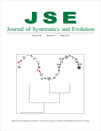
Journal of Systematics and Evolution
Empowering Discoveries in Evolutionary StudiesThe Journal of Systematics and Evolution, published by WILEY, is a premier academic journal dedicated to advancing the fields of Ecology, Evolution, Behavior, and Systematics and Plant Science. With a distinguished Q1 ranking in both of these critical categories in 2023, it stands at the forefront of scientific research, placing it in the top quartile among its peers. Featuring both an ISSN of 1674-4918 and an E-ISSN of 1759-6831, the journal has been converging innovative research since its inception in 2008. The journal caters to a global audience of researchers, professionals, and students, providing a platform for disseminating significant findings and fostering academic dialogue. Its impressive Scopus rankings further affirm its impact, coming in at Rank #62/721 in Ecology and Rank #48/516 in Plant Science, highlighting its relevance and influence in these vibrant fields. As an open-access journal, it ensures that groundbreaking research is accessible to all, thus enhancing collaborative opportunities within the scientific community.

ORGANISMS DIVERSITY & EVOLUTION
Unveiling Nature's Complexity: A Journal of Discovery and DialogueOrganisms Diversity & Evolution is a premier academic journal published by Springer Heidelberg, dedicated to advancing the fields of ecology, evolution, behavior, and systematics. Established in 2001 and continuing through 2024, this journal plays a crucial role in disseminating high-quality research that explores the complexities of biological diversity and evolutionary processes. With a commendable 2023 Scopus ranking of #253/721 in its category, placing it in the 64th percentile, and categorized in the Q2 quartile for Ecology and Evolution, it consistently attracts contributions from leading scientists and researchers worldwide. Although it operates on a subscription basis, the journal's rigorous peer-review process and dedication to impactful scientific discourse make it an invaluable resource for academics, practitioners, and students keen on understanding the intricate relationships that shape our biodiversity. By highlighting innovative research and fostering discussions on urgent ecological challenges, Organisms Diversity & Evolution serves as a vital platform for those committed to conservation and evolutionary biology.
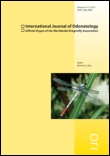
INTERNATIONAL JOURNAL OF ODONATOLOGY
Fostering Knowledge in Insect Behavior and EcologyINTERNATIONAL JOURNAL OF ODONATOLOGY, published by Wachholtz Verlag GmbH, is a vital resource for researchers and professionals in the fields of Ecology, Evolution, Behavior, and Insect Science. Established in 1998, this journal provides a platform for the dissemination of innovative research pertaining to odonatology, encompassing the ecological and biological interactions of dragonflies and damselflies. With its focus on advancing knowledge within these scientific disciplines, the journal holds a commendable Q3 ranking in Ecology, Evolution, Behavior and Systematics and a Q2 ranking in Insect Science for 2023, reflecting its significance in academic circles. Although it operates without open access, its articles are accessible through institutional subscriptions, allowing for wide dissemination among scholars and practitioners. The journal's commitment to publishing high-quality, peer-reviewed research makes it an authoritative source of information that enriches the study of odonates and their broader ecological contexts. For inquiries, the journal's editorial team can be reached at C/O Fleet7, Fleethorn 7, Kiel 24103, Germany.

Insect Systematics and Diversity
Connecting the Dots in Insect Evolutionary StudiesInsect Systematics and Diversity, published by Oxford University Press Inc., stands as a leading journal in the realm of entomological research, boasting an impressive impact factor driven by its rigorous peer-review process and high-quality publications. With a focus on animal science, zoology, developmental biology, and insect science, the journal is expertly positioned to address the complexities of insect evolution, behavior, and ecological interactions. Since its inception in 2017, the journal has rapidly gained recognition, achieving Q1 quartile ranks in multiple categories, including Insect Science and Ecology, Evolution, Behavior, and Systematics, indicating its relevance and prestige within the academic community. Researchers, professionals, and students alike will find invaluable insights, methodologies, and discussions that propel the understanding of insect diversity and systematics, ensuring the journal is an essential resource for advancing knowledge in this dynamic field. The journal provides access to a wealth of information, fostering collaboration and engagement within the global scientific community.

RUSSIAN JOURNAL OF THERIOLOGY
Connecting Researchers in Animal Science and EcologyRUSSIAN JOURNAL OF THERIOLOGY is a prominent academic journal published by KMK SCIENTIFIC PRESS LTD in collaboration with the esteemed Moscow State University. As a dedicated platform for researchers in the fields of Animal Science and Zoology, Ecology, Evolution, Behavior and Systematics, and Plant Science, this journal strives to advance our understanding of terrestrial ecosystems and their inhabitants. Although it currently holds a Q4 ranking and ranks within the lower percentiles of its respective categories, the journal's consistent publishing output since 2011 showcases a commitment to facilitating scientific discourse and collaboration. Addressed to a diverse audience of researchers, professionals, and students, RUSSIAN JOURNAL OF THERIOLOGY serves as an essential resource for disseminating valuable insights and fostering future advancements in the biological sciences.
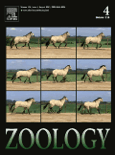
ZOOLOGY
Exploring innovative insights in zoology.ZOOLOGY, an esteemed journal published by Elsevier GmbH, stands at the forefront of research in the Animal Science and Zoology fields. With a notable impact factor and recognized as a Q1 category journal in its discipline, ZOOLOGY is highly regarded among researchers, ranking #98 out of 490 in Scopus rankings. Founded in 1994 and continuing through to 2024, the journal aims to publish cutting-edge, peer-reviewed articles that contribute significantly to the understanding of zoological sciences. Based in Munich, Germany, ZOOLOGY provides both subscription and open access options, ensuring that influential research reaches a wider audience. It serves as an essential platform for disseminating innovative findings, connecting scholars globally, and fostering interdisciplinary collaboration to advance zoological knowledge.

CONTRIBUTIONS TO ZOOLOGY
Fostering Collaboration in the World of ZoologyCONTRIBUTIONS TO ZOOLOGY, published by BRILL, is a premier scholarly journal dedicated to advancing the field of zoological sciences. With an ISSN of 1383-4517 and an E-ISSN of 1875-9866, this journal serves as a vital platform for researchers, professionals, and students seeking to share their findings and insights related to animal science, ecology, evolution, and systematics. Recognized for its high academic standards, it ranks in the top quartile (Q1) for Animal Science and Zoology, and Q2 for Ecology, Evolution, Behavior, and Systematics, reflecting its significance and influence in the scholarly community. The journal has been consistently published since 1994 and continues to contribute pivotal knowledge that informs and shapes contemporary zoological research. Researchers can access the journal through traditional subscription models, ensuring broad dissemination of its impactful articles and studies. Contributions to Zoology plays an essential role in fostering collaboration and discussion within the zoological community in the Netherlands and beyond.
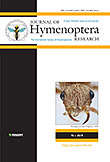
JOURNAL OF HYMENOPTERA RESEARCH
Championing Research that Shapes Our Understanding of InsectsJOURNAL OF HYMENOPTERA RESEARCH is a leading open-access publication dedicated to the advancement of knowledge in the fields of Insect Science, Animal Science and Zoology, and Ecology. Published by Pensoft Publishers since 2011, this journal plays a critical role in facilitating the exchange of significant research findings and insights related to Hymenoptera, a diverse order of insects that includes bees, wasps, and ants. With a commendable impact factor and ranked in the Q1 category for Insect Science and Animal Science, the journal stands out within the scientific community, drawing contributions from researchers globally. Boasting an ISSN of 1070-9428 and an E-ISSN of 1314-2607, the journal not only ensures broad accessibility to its content but also fosters a collaborative environment for professionals and students alike to engage with pioneering research. By reflecting on the converged years of 2007-2024, the JOURNAL OF HYMENOPTERA RESEARCH remains a vital resource for understanding the ecological and evolutionary dynamics of this important group of insects, solidifying its position as a cornerstone in entomological studies.